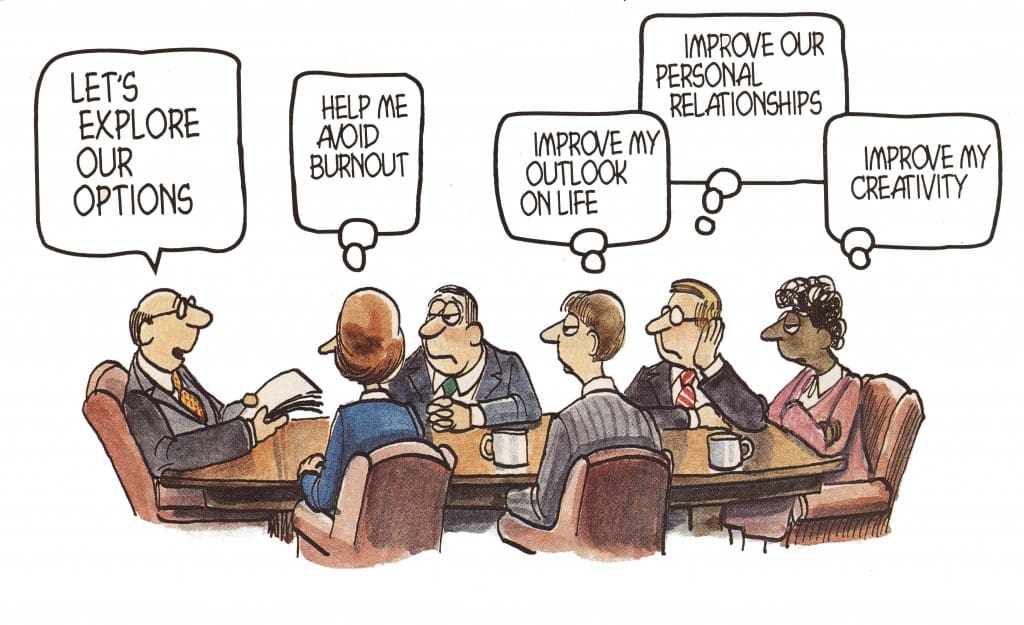 “The trouble with always trying to preserve the health of the body is that it is so difficult to do without destroying the health of the mind.”
“The trouble with always trying to preserve the health of the body is that it is so difficult to do without destroying the health of the mind.”
—G.K. Chesterton, Author
Your emotional health is as important as your physical health, if not more
Most leaders I work with are aware of the importance of their physical health, particularly the importance of eating nutritious foods, exercising and treating their physical injuries and ailments. Most of them, however, pay little attention at all to their emotional health.
Guy Winch, in his TED talk, “Why We All Need to Practice Emotional First Aid,” states:
We sustain psychological injuries even more often than we do physical ones, injuries like failure or rejection or loneliness. And they can also get worse if we ignore them, and they can impact our lives in dramatic ways.
You wouldn’t make a physical injury worse on purpose. You wouldn’t get a cut on your arm and decide, “Oh, I know! I’m going to take a knife and see how much deeper I can make it.”
But, we do that with psychological injuries all the time. Why? Because of poor emotional hygiene. Because we don’t prioritize our psychological health. We know from dozens of studies that when your self-esteem is lower, you are more vulnerable to stress and to anxiety, that failures and rejections hurt more and it takes longer to recover from them.
Are you a leader who believes emotions do not belong at work?
Or, maybe you don’t see the value of emotions anywhere. If so, I’m here to set you straight! Based on my experience:
- Behind every business issue is a corresponding emotional issue. Until these emotional issues are dealt with, the business issues cannot be resolved. How many times have you seen someone’s emotional health and professional performance move in tandem?
- There is a saying, “The health of a business is limited by the health of its leader.” If the leader isn’t emotionally healthy, the emotional health of the organization suffers along with the performance of the business.
- Most of us, myself included, were never taught how to process emotions. When they appear, we either try to ignore them or to avoid them altogether. Unfortunately, this puts your emotions in control, and these feelings don’t go away until you have processed them. As Carl Jung observed, “What you resist not only persists, but will grow in size.”
- HeartMath Institute (HMI) Research Director Dr. Rollin McCraty writes in his scientific paper, “Heart-Brain Neurodynamics: The Making of Emotions.”
“The importance of gaining a deeper understanding of the emotional system…has become increasingly recognized as an important scientific undertaking, as it has become clear that emotions underlie the majority of the stress we experience, influence our decisions, provide the motivation for our actions, and create the textures that determine our quality of life.”
- Managing your emotions helps you get into a state of flow.
Now, I hope you are re-thinking the importance of emotions!
How do you improve your emotional health?
In his book, “Search Inside Yourself: The Unexpected Path to Achieving Success, Happiness (and World Peace),” Chade-Meng Tan, Google’s “Jolly Good Fellow” states in his Ted Talk:
Leadership training in Google, for example, places a lot of emphasis on the inner qualities, such as self-awareness, self-mastery, empathy and compassion, because we believe that leadership begins with character. We even created a seven-week curriculum on emotion intelligence, which we jokingly call “Searching Inside Yourself.”
One element of Meng’s Search Inside Yourself approach is a focus on inner development and personal growth, containing 3 components:
- Attention training. Where we place our focus of attention is the foundation of emotional intelligence. The goal is to train your attention to create a calm and clear mind.
- Self-knowledge and self-mastery uses your trained attention to objectively observe your thought stream and emotions. This forms the basis of deep self-knowledge that eventually enables self-mastery.
- Creating useful mental habits. Imagine that your first thought when you see someone is, “I wish for this person to be happy.” Meng believes that this mental habit changes everything at work, because this sincere goodwill is picked up unconsciously by others and creates trust that leads to highly productive collaborations.
The Dalai Lama suggests something similar: noticing the emotional beginnings that signal a negative emotion is developing, or stirring. Then, reflect on what those stirrings might indicate. As a result, you may have a fresh perspective on your feelings and avoid repeating any old rote thoughts that usually accompany your negative emotions.
Guy Winch ends his TED talk with:
By taking action when you’re lonely, by changing your responses to failure, by protecting your self-esteem, by battling negative thinking, you won’t just heal your psychological wounds, you will build emotional resilience, you will thrive. A hundred years ago, people began practicing personal hygiene, and life expectancy rates rose by over 50 percent in just a matter of decades. I believe our quality of life could rise just as dramatically if we all began practicing emotional hygiene.
Can you imagine what the world would be like if everyone was psychologically healthier? If there were less loneliness and less depression? If people knew how to overcome failure? If they felt better about themselves and more empowered? If they were happier and more fulfilled? I can, because that’s the world I want to live in, and that’s the world my brother wants to live in as well. And if you just become informed and change a few simple habits, well, that’s the world we can all live in.
I couldn’t have summed it up better. I now invite you to start down the path of becoming an emotional master!



